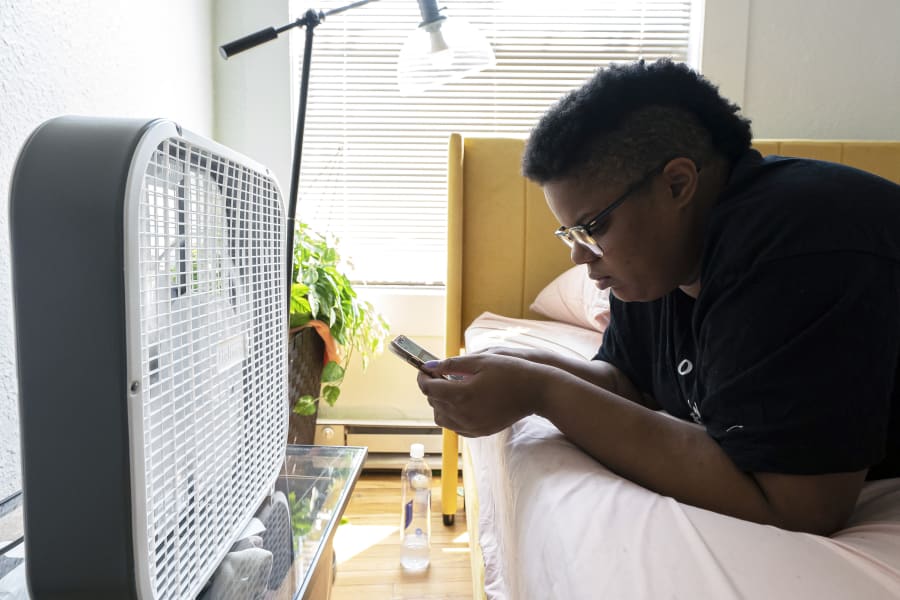PORTLAND, Ore. – Volunteers scrambled to hand out water, portable fans, popsicles and information about cooling shelters Thursday to homeless people living in isolated encampments on the outskirts of Portland, Oregon, as the Pacific Northwest sweated through a heat wave gripping the normally temperate region.
Authorities trying to provide relief to the vulnerable, including low-income older people and those living outdoors, are mindful of a record-shattering heat wave in late June that killed hundreds in Oregon, Washington and British Columbia when the thermometer went as high as 116 degrees Fahrenheit (47 C).
Recommended Videos
In Portland, temperatures reached 102 F (39 C) by late afternoon, and more heat was expected Friday. It was hotter than Phoenix, where the high in the desert city was a below-normal 100 F (38 C). In Seattle, highs were in the 90s in a region where many don't have air conditioning. In Bellingham, Washington, on Thursday the high hit 100 F (38 C) for the first time on record.
Scorching weather also hit other parts of the U.S. this week. The National Weather Service said heat advisories and warnings are in effect from the Midwest to the Northeast and mid-Atlantic through at least Friday. And in Michigan, heavy rains brought flooding, leaving nearly 1 million homes and businesses without power at one point Thursday in the hot weather.
In Portland, a nonprofit group that serves the homeless and those with mental illness used three large vans to transport water and other cooling items to homeless encampments along the Columbia River on the eastern outskirts of the city.
The effort was important because people experiencing homelessness are often reluctant to go to cooling centers, said Kim James, director of homeless and housing support for Cascadia Behavioral Healthcare.
Scott Zalitis, who was shirtless in the heat, gorged himself on lime-green popsicles handed out by the group and told volunteers that the temperature at his campsite reached 105 F (41 C) the day before. A huge cooler full of food spoiled when all the ice melted and he couldn't find any more to buy.
“It’s miserable. I can’t handle the heat no matter what. So, I mean, it’s hard to stand. Even in the shade it’s too hot," said Zalitis, who became homeless last year when the apartment where he subleased a room burned down in an electrical fire. “You want to stay somewhere that’s cool, as cool as possible.”
The encampment, where rusted-out cars and broken-down RVs mixed with tents and piles of garbage, was in sharp contrast to downtown Portland, where sweaty pedestrians cooled off by running through a large public fountain in a riverfront park.
Luna Abadia, 17, was out training with her cross country team from Lincoln High School in the morning when the group stopped for a few minutes at the fountain. The runners normally train at 4 p.m., but in recent weeks, they have have had to shift it to 8 a.m. — and it's still oppressively hot, she said.
“It was very hot, lots of sweat. That’s something we’ve noticed in the past week or so,” Abadia said.
Oregon Gov. Kate Brown has declared a state of emergency and activated an emergency operations center, citing the potential for disruptions to the power grid and transportation. City and county governments have opened cooling centers, extended public library hours and waived bus fare for those headed to cooling centers. A 24-hour statewide help line will direct callers to the nearest cooling shelter and offer safety tips.
The back-to-back heat waves, coupled with a summer that's been exceptionally warm and dry overall, are pummeling a region where summer highs usually drift into the 70s or 80s. Intense heat waves and a historic drought in the American West reflect climate change that is making weather more extreme.
“For the heat wave, at this level, it is new territory,” said Dan Douthit, spokesman for the Portland Bureau of Emergency Communications. “We’re known for the potential for earthquakes, we have fires, floods — but it seems like heat waves are becoming a very serious emergency."
Abadia said changes brought on by climate change that she has noticed in her life prompted her to start a youth-run organization to get more young people involved in the issue.
“Climate change is everything I’ve been thinking about for the past weeks,“ she said. “This heat wave and the wildfires we faced here a year ago — and even now around the world — have really been a new reminder to what we’re facing and, kind of, the immediate action that needs to be taken."
___
Follow Flaccus on Twitter at http://www.twitter.com/gflaccus.

















